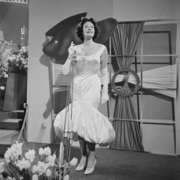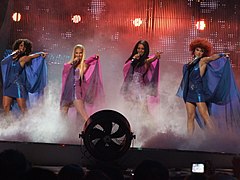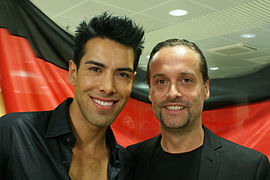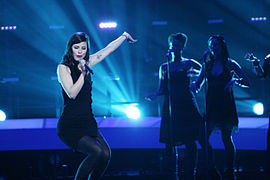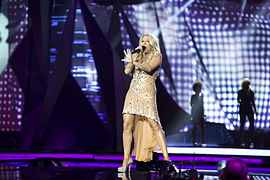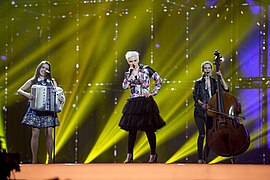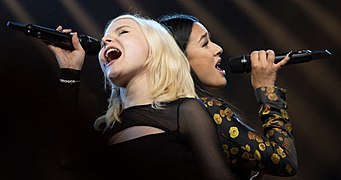Germany at the Eurovision Song Contest
- Broadcasting company
-

(Member of )
)
- First participation
- 1956
- Number of participations
- 63 (as of 2019)
- Highest ranking
- 1 ( 1982 , 2010 )
- Highest Score
- 340 ( 2018 )
- Lowest Score
- 0 ( 1964 , 1965 , 2015 )
- Points average (since first post)
- 65.20 (as of 2019)
- Average points per voting country in the 12-point system
- 2.38 (as of 2019)
This article deals with the history of Germany as a participant in the Eurovision Song Contest .
Regularity of participation and successes in competition
The Federal Republic of Germany took part in the first Eurovision Song Contest as early as 1956. Apart from the Swiss victory in 1956, the remaining placements were never announced. In 1957 Margot Hielscher got a good place with place 4 out of 10. In 1958, when Margot Hielscher competed for Germany again, she only landed 7th out of 10. In 1959 Alice and Ellen Kessler achieved a similar placement with 8th place out of 11. In 1960 Wyn Hoop succeeded in reaching 4th place out of 13 for West Germany and thus again achieving a good result. In 1961 Lale Andersen took 13th place out of 16 but a rather poor result. In 1962 and 1963, Germany came in 6th and 9th respectively in the top ten. In 1964 and 1965, however, the country achieved its worst results to date. In both years Germany came in last with 0 points. However, the last two places were shared with three other countries. In the years that followed, Germany was more successful.
From 1966 to 1973, the Federal Republic reached a place in the top ten every year. With Katja Ebstein in 1970 and 1971 and Mary Roos in 1972, the country took third place three times in a row. It was not until 1974 that it was not placed in the top ten: in 1974 Cindy & Bert ended up in last place. Nevertheless, this last place was again divided for Germany, as again three other countries landed in last place together with the Federal Republic of Germany. But even in 1975 and 1976 Germany only landed in the lower part of the table with 17th place out of 19 and 15th place out of 18. From 1977, however, Germany's most successful time in the competition began.
From 1977 to 1987, with the exception of 1984, Germany achieved a place among the top ten in the competition every year. In 1977 Silver Convention took 8th place out of 18 and in 1978 Ireen Sheer took 6th place out of 20. In 1979 Dschinghis Khan reached 4th place. In 1980, when Katja Ebstein was representing Germany for the third time, she took 2nd place, an even better place than her own previous participations in 1970 and 1971. Also in 1981 Lena Valaitis got 2nd place for the Federal Republic, which the country could achieve for the second time this place. In 1982, the Federal Republic of Germany won its first competition. Nicole won the entire competition with her song A Bit of Peace and, with 161 points, got Germany's highest number of points in the competition. In 1983, when the competition took place in Germany, the duo Hoffmann & Hoffmann also achieved a good ranking with 5th place. It was not until 1984 that Mary Roos, who had represented Germany in 1972 and taken third place, achieved a rather average placement with position 13 out of 19. A year later, however, the band Wind was able to achieve a very good placement again with second place. In 1986, Ingrid Peters achieved another place in the top ten with 8th place out of 20. In 1987 the band Wind appeared again for Germany and was able to repeat their success of 1985. They reached second place again and already took Germany's fourth second place in the competition. From 1988, however, this successful period for Germany in competition ended.
In 1988 and 1989, Germany achieved its worst position since 1976 with 14th place. In 1990, however, the duo Chris Kempers & Daniel Kovac achieved a place in the top ten with 9th place. In 1991 and 1993, Germany took an average place again with 18th place. Wind, who represented the country in 1985 and 1987 and reached second place respectively, only took 16th place in 1992, so it was all the more surprising that the band Mekado was able to take third place for Germany in 1994. After this brief ray of hope, a last place followed in 1995 with the duo Stone & Stone. Because Germany failed in the internal qualifying round of the EBU in 1996, Germany had to sit out of the competition for the first time. In 1997, Germany returned to the competition and became part of the “big ones” introduced - the Big Four (Germany, France, Great Britain, Spain), since 2011 the Big Five (with Italy), the largest EBU contributors - and thus always has a guaranteed final place. This measure was introduced to ensure the long-term participation of the large donors (Spain, Great Britain, France and Germany, from 2011 also Italy) and thus the survival of the contest. The return of Germany in 1997 was not very successful. With 18th place, only an average place was achieved. It was not until 1998 that Germany was successful again in the competition.
In 1998, Guildo Horn took 7th place again in the top ten. In 1999 and 2000 the band Sürpriz with 3rd place and Stefan Raab with 5th place also achieved good placements. Michelle 2001 also got 8th place among the top ten in the competition. It wasn't until 2002 that Corinna May got a worse placement again with 21st place. In 2003 Lou was able to achieve an average placement again with 12th place. In 2004, Max Mutzke took 8th place again and was among the top ten in the competition. In the following years, Germany was no longer so successful. In 2005 Gracia reached the last place for Germany with place 24. Also in 2006 the band Texas Lightning could only get an average place with 15th place. With 19th place, Roger Cicero also only got a rather worse placement. Also in 2008 the No Angels could not achieve a good ranking and were among the last three, although they were tied with two other countries and only had an advantage due to the tie-break rules. In 2009, the next bad place was achieved with 20th place. It was not until 2010 that artists were able to achieve success for Germany in the competition.
In 2010, Germany was finally able to win the Eurovision Song Contest with Lena for the second time since 1982 and with 246 points, the highest score for Germany to date. After this success, Lena was sent for the second time in 2011. With 10th place she also got another placement among the top ten in the competition. Roman Lob also got a good place in 2012 with 8th place. Only Cascada got a worse ranking in 2013 with 21st place. In 2014, Elaiza achieved an only average placement with 18th place. From 2015 to 2017, Germany then reached its lowest point in the competition. In 2015 Ann Sophie came last with 0 points. However, she was tied with Austria, whereupon the tie-break rules were used again. However, since with 0 points no statistics of the points received could provide clarity, the starting position decided on the placement, which was in favor of Austria. Thus, in 2015 Germany achieved its worst result in the competition to date. In 2016, Germany came last for the second time in a row. Levina could not achieve a good placement in 2017 either and ended up in penultimate place. All the greater was the surprise that Michael Schulte took 4th place for Germany in 2018 and was thus able to achieve the best result since 2010. With 340 points (Germany's highest number of points so far) he was only two points short of third place. This success, however, should remain an exception, because in the following year Germany landed again on the penultimate place.
With seven last places (1964, 1965, 1974, 1995, 2005, 2015, 2016), Germany is next to Austria behind Belgium (eight times) as well as Finland and Norway (eleven times each) the country that came fourth most frequently at the bottom. In 1964, 1965 and 2015 the German contributions even reached zero points. With two wins (1982 and 2010), four second places (1980, 1981, 1985, 1987) and five third places (1970, 1971, 1972, 1994, 1999), Germany is one of the average successful countries in the competition. With 63 participations, Germany is also the country with the most participations in the competition. After all, Germany sent a contribution every year and only had to suspend it once since 1956 (1996). Germany thus never stayed away from the competition voluntarily.
List of posts
Color legend: - 1st place. - 2nd place. - 3rd place. - Equal points with last place. - Eliminated in the semifinals / in the qualification / in the Eastern European preliminary decision. - no participation / not qualified. - Cancellation of the Eurovision Song Contest.
| year | Interpreter | Title Music (M) and Text (T) |
language | translation | final | Semi-final / qualification |
Charts (D) |
||
|---|---|---|---|---|---|---|---|---|---|
| space | Points | space | Points | ||||||
| 1956 | Walter Andreas Schwarz |
In the waiting room for great happiness M / T: Walter Andreas Schwarz |
German | - | k. A. / 14 | k. A. | Direct participation | - | |
| Freddy Quinn |
This is how it goes every night M: Lotar Olias ; T: Peter Moesser |
German | - | k. A. / 14 | k. A. | 19th | |||
| 1957 | Margot Hielscher |
Telephone, Telephone M: Friedrich Meyer ; T: Ralph Maria Siegel |
German a. | - | 4/10 | 8th | - | ||
| 1958 | Margot Hielscher |
For two groschen of music M: Friedrich Meyer ; T: Fred Rauch , Walter Brandin |
German | - | 7/10 | 5 | - | ||
| 1959 | Alice and Ellen Kessler |
Tonight we want to go dancing M: Helmut Zander; T: Astrid Voltmann |
German | - | 8/11 | 5 | - | ||
| 1960 | Wyn Hoop |
Bonne nuit, ma chérie M: Franz Josef Breuer ; T: Kurt Schwabach |
German b. | Goodnight My Love | 4/13 | 11 | 44 | ||
| 1961 | Lale Andersen |
Once we see each other again M: Rudolf Maluck; T: Ernst Bader |
German, French | - | 13/16 | 3 | 30th | ||
| 1962 | Conny Froboess |
Two little Italians M: Christian Bruhn ; T: Georg Buschor |
German | - | 6/16 | 9 | 1 | ||
| 1963 | Heidi Brühl |
Marcel M / T: Charly Niessen |
German | - | 9/16 | 5 | 36 | ||
| 1964 | Nora Nova |
You get used to beauty so quickly M: Rudi von der Dovenmühle ; T: Niels Nobach |
German | - | 13/16 | 0 | - | ||
| 1965 | Ulla Wiesner |
Paradise where are you M: Hans Blum ; T: Barbara Kist |
German | - | 15/18 | 0 | - | ||
| 1966 | Margot Eskens |
The hands of the clock M: Walter Dobschinski ; T: Hans Bradtke |
German | - | 10/18 | 7th | - | ||
| 1967 | Inge Brück |
Anouschka M / T: Hans Blum |
German | - | 8/17 | 7th | - | ||
| 1968 | Wencke Myhre |
A high of love M: Horst Jankowski ; T: Carl J. Schäuble |
German | - | 6/17 | 11 | 18th | ||
| 1969 | Siw Malmkvist |
Prima ballerina M / T: Hans Blum |
German | - | 9/16 | 8th | 13 | ||
| 1970 | Katja Ebstein |
There are always miracles M: Christian Bruhn ; T: Günther Loose |
German | - | 3/12 | 12 | 16 | ||
| 1971 | Katja Ebstein |
This world M: Dieter Zimmermann ; T: Fred Jay |
German | - | 3/18 | 100 | 16 | ||
| 1972 | Mary Roos |
Only love lets us live M: Joachim Heider ; T: Joachim Relin |
German | - | 3/18 | 107 | 17th | ||
| 1973 | Gitte |
Young day M: Günther-Eric Thöner; T: Stephan Lego |
German | - | 8/17 | 85 | 19th | ||
| 1974 | Cindy & Bert |
The summer melody M: Werner Scharfenberger ; T: Kurt Feltz |
German | - | 14/17 | 3 | - | ||
| 1975 | Joy Fleming |
A song can be a bridge M: Rainer Pietsch ; T: Michael Holm |
German, English | - | 17/19 | 15th | 32 | ||
| 1976 | The Les Humphries Singers 1 |
Sing Sang Song M: Ralph Siegel ; T: Kurt Hertha |
German | Singsong song | 15/18 | 12 | 45 | ||
| 1977 | Silver Convention |
Telegram M: Sylvester Levay ; T: Michael Kunze |
English | telegram | 8/18 | 55 | 27 | ||
| 1978 | Ireen Sheer |
Fire M: Jean Frankfurter ; T: John Möring |
German | - | 6/20 | 84 | 39 | ||
| 1979 | Genghis Khan |
Dschinghis Khan M: Ralph Siegel ; T: Bernd Opinion |
German | - | 4/19 | 86 | 1 | ||
| 1980 | Katja Ebstein |
Theater M: Ralph Siegel ; T: Bernd Opinion |
German | - | 2/19 | 128 | 11 | ||
| 1981 | Lena Valaitis |
Johnny Blue M: Ralph Siegel ; T: Bernd Opinion |
German | - | 2/20 | 132 | 9 | ||
| 1982 | Nicole |
A little peace M: Ralph Siegel ; T: Bernd Opinion |
German | - | 1 /18 | 161 | 1 | ||
| 1983 | Hoffmann & Hoffmann |
Consideration M: Michael Reinecke ; T: Volker Lechtenbrink |
German | - | 5/20 | 94 | 8th | ||
| 1984 | Mary Roos |
Walking upright M: Michael Reinecke ; T: Michael Kunze |
German | - | 13/19 | 34 | 56 | ||
| 1985 | wind |
For all M: Hanne Haller ; T: Bernd Opinion |
German | - | 2/19 | 105 | 18th | ||
| 1986 | Ingrid Peters |
Cross the bridge M / T: Hans Blum |
German | - | 8/20 | 62 | 45 | ||
| 1987 | wind |
Let the sun in your heart M: Ralph Siegel ; T: Bernd Opinion |
German | - | 2/22 | 141 | 20th | ||
| 1988 | Maxi & Chris Garden |
Song for a Friend M: Ralph Siegel ; T: Bernd Opinion |
German | - | 14/21 | 48 | 29 | ||
| 1989 | Nino de Angelo |
Aviator M: Dieter Bohlen ; T: Joachim Horn-Benges |
German | - | 14/22 | 46 | 13 | ||
| 1990 | Chris Kempers & Daniel Kovac |
Live Free M: Ralph Siegel ; T: Michael Kunze |
German | - | 9/22 | 60 | 51 | ||
| 1991 | Atlantis 2000 |
This dream must never die M: Alfons Weindorf ; T: Helmut Frey |
German | - | 18/22 | 10 | - | ||
| 1992 | wind |
Dreams are there for everyone M: Ralph Siegel ; T: Bernd Opinion |
German | - | 16/23 | 27 | 59 | ||
| 1993 | Münchener Freiheit |
Way too far M / T: Stefan Zauner |
German | - | 18/25 | 18th | 53 | ||
| 1994 | Mekado |
We're giving a party M: Ralph Siegel ; T: Bernd Opinion |
German | - | 3/25 | 128 | Qualified directly for the final | 100 | |
| 1995 | Stone & Stone |
In love with you M / T: Cheyenne Stone |
German | - | 23/23 | 1 | - | ||
| 1996 | Leon |
Planet of Blue M / T: Hanne Haller |
German c. | Blue planet |
Not qualified qualifying round |
24/29 | 24 | - | |
| 1997 | Bianca Shomburg |
Time M: Ralph Siegel ; T: Bernd Opinion |
German | - | 18/25 | 22nd | Qualified directly for the final | 90 | |
| 1998 | Guildo Horn |
Guildo loves you! M / T: Stefan Raab as Alf Igel |
German | - | 7/25 | 86 | 4th | ||
| 1999 | Sürpriz 2 |
Trip to Jerusalem - Kudüs'e seyahat M: Ralph Siegel ; T: Bernd Opinion |
German, Turkish , English d. | - | 3/23 | 140 | - | ||
| 2000 | Stefan Raab |
Wadde hadde dudde there? M / T: Stefan Raab |
German English | What have you got there? | 5/24 | 96 | 2 | ||
| 2001 | Michelle |
Who Lives Love M: Gino Trovatello, Matthias Stingl; T: Eva Richter, Mary Applegate |
German English | - | 8/23 | 66 | 32 | ||
| 2002 | Corinna May |
I Can't Live Without Music M: Ralph Siegel ; T: Bernd Opinion |
English | I can not live without music | 21/24 | 17th | 72 | ||
| 2003 | Lou |
Let's Get Happy M: Ralph Siegel ; T: Bernd Opinion |
English | Let's be happy | 12/26 | 53 | - | ||
| 2004 | Max Mutzke |
Can't Wait Until Tonight M / T: Stefan Raab |
English, Turkish | Can't wait until tonight | 8/24 | 93 | 1 | ||
| 2005 | Gracia |
Run & Hide M: David Brandes , Jane Tempest; T: Bernd Augener (as "John O'Flynn") |
English | Run and hide | 24/24 | 4th | 20th | ||
| 2006 | Texas Lightning |
No No Never M / T: Jane Comerford |
English | No, no, never | 15/24 | 36 | 1 | ||
| 2007 | Roger Cicero |
Women rule the world M: Matthias Haß ; T: Frank Ramond |
German English | - | 19/24 | 49 | 7th | ||
| 2008 | No Angels |
Disappear M / T: Remee , Hanne Sørvaag, Thomas Troelsen |
English | Disappear | 23/25 3 | 14th | 4th | ||
| 2009 | Alex Swings Oscar Sings! |
Miss Kiss Kiss Bang M / T: Alex Christensen , Steffen Häfelinger |
English | - | 20/25 | 35 | 20th | ||
| 2010 | Lena |
Satellite M: Julie Frost , John Gordon ; T: Julie Frost |
English | satellite | 1 / 25th | 246 | 1 | ||
| 2011 | Lena |
Taken by a Stranger M / T: Gus Seyffert, Monica Birkenes, Nicole Morier |
English | Fascinated by a stranger | 10/25 | 107 | 2 | ||
| 2012 | Roman praise |
Standing Still M / T: Jamie Cullum , Steve Robson, Wayne Hector |
English | Stand still | 8/26 | 110 | 3 | ||
| 2013 | Cascada |
Glorious M / T: Manuel Reuter , Yann Peifer , Andres Ballinas, Tony Cornelissen |
English | Glorious | 21/26 | 18th | 6th | ||
| 2014 | Elaiza |
Is It Right M: Elżbieta Steinmetz , Frank Kretschmer; T: Elżbieta Steinmetz , Adam Kesselhaut |
English | Is it right? | 18/26 | 39 | 4th | ||
| 2015 | Ann Sophie 4 |
Black Smoke M / T: Michael Harwood, Ella McMahon, Tonino Speciale |
English | Black smoke | 27/27 5 | 0 | 26th | ||
| 2016 | Jamie-Lee 6 |
Ghost M: Thomas Burchia, Anna Leyne, Conrad Hensel; T: Anna Leyne |
English | ghost | 26/26 | 11 | 11 | ||
| 2017 | Levina |
Perfect Life M / T: Lindy Robbins, Dave Bassett, Lindsey Ray |
English | Perfect life | 25/26 | 6th | 28 | ||
| 2018 | Michael Schulte |
You Let Me Walk Alone M / T: Michael Schulte, Thomas Stengaard, Nisse Ingwersen, Nina Müller |
English | You let me go alone | 4/26 | 340 | 3 | ||
| 2019 | S! Sters |
Sister M / T: Laurell Barker, Marine Kaltenbacher, Tom Oehler, Thomas Stengaard |
English | sister | 25/26 | 24 | - | ||
|
|
Ben Dolic |
Violent Thing M: Borislaw Milanow , Peter St. James, Dag Lundberg, Jimmy Thorén, Connor Martin; T: Borislaw Milanow , Peter St. James, Dag Lundberg |
English | Violent thing |
Cancellation due to the COVID-19 pandemic by the EBU |
- | |||
| 2021 | Qualified directly for the final | - | |||||||
Preliminary decisions
In most cases, the German contributions were chosen in preliminary decisions, which up to and including 1992 were entitled Ein Lied für ... (supplemented by the name of the host city). In 1959, 1966 to 1968, 1974, 1977, 1993 to 1995, as well as 2009 and 2020, the German contributions were selected by ARD without a public vote; in 1978 the preliminary decision was only played on the radio.
Lead broadcaster
| Year (s) | Broadcaster |
|---|---|
| 1956 | Northwest German Broadcasting (NWDR) |
| 1957 | Hessischer Rundfunk (hr) |
| 1958 | West German Broadcasting (WDR) |
| 1959 - 1961 | Hessischer Rundfunk (hr) |
| 1962 | Südwestfunk (SWF) |
| 1963 / 64 | Hessischer Rundfunk (hr) |
| 1965 | North German Broadcasting (NDR) |
| 1966 - 1971 | Hessischer Rundfunk (hr) |
| 1972 | Sender Free Berlin (SFB) |
| 1973 - 1977 | Hessischer Rundfunk (hr) |
| 1978 | Südwestfunk (SWF) |
| 1979 - 1990 | Bavarian Broadcasting (BR) |
| 1991 | Sender Free Berlin (SFB) in cooperation with the German TV broadcaster DFF |
| 1992 - 1995 | Central German Broadcasting (MDR) |
| 1996 - 2009 | North German Broadcasting (NDR) |
| 2010 - 2012 | Norddeutscher Rundfunk (NDR) in cooperation with the private broadcaster ProSieben (Pro7) |
| since 2013 | North German Broadcasting (NDR) |
languages
From a linguistic point of view, Germany was a pioneer in the competition in three cases: in 1957 the first contribution was made that contained a few words in non-national languages (some greetings during Margot Hielscher's telephone conversation), in 1960 the first country with a song title in a foreign language (Bonne nuit , ma Chérie) and in 1961 the first country to have an entire refrain of its contribution sung in a foreign language (Lale Andersen sang the last chorus of Once we meet again in French). German was also mixed with other languages on other occasions, mostly English (1975, 1976, 2000, 2001 and 2007 and the unqualified contribution in 1996) and in 1999 with English, Turkish and Hebrew.
| language | Contributions | in % |
|---|---|---|
| German | 43.25 | 68.65 |
| English | 18.25 | 28.97 |
| Turkish | 0.75 | 1.19 |
| French | 0.50 | 0.79 |
| Hebrew | 0.25 | 0.40 |
Many German contributions were recorded in other languages, most of them in English. Nicole recorded her winning title in 1982 in seven other and a few mixed versions, which is a record for a winning title. Other contributions were also recorded in other languages, for example the three Scandinavians Siw Malmkvist, Wencke Myhre and Gitte also sang their contributions in their national languages Swedish, Norwegian and Danish. Two contributions were even sung in Japanese by the original interpreters, namely Freddy Quinn's So It Goes Every Night in 1956 and Katja Ebstein's Miracle occurs again and again in 1970.
Commercial success
Many German contributions became national hits. A total of 39 of the 48 contributions since 1960 (since reliable information has been available) reached the German single charts, including twelve top 10 hits, six of which again reached first place ( Zwei kleine Italiener 1962, Dschinghis Khan 1979, Ein Bitchen Frieden 1982, Can't Wait Until Tonight 2004, No No Never 2006 and Satellite 2010). Two little Italians by Conny Froboess is the German competition entry that has sold the most so far. Texas Lightning follows in second place with No No Never .
The first German winner in the competition, A Bit of Peace , was also a top seller internationally and reached first place in the charts in several countries, including Great Britain and Ireland . The winning entry in 2010, Satellite , took first place in Denmark, Germany, Finland, Norway, Sweden and Switzerland, as well as top 10 positions in several other countries.
Other German contributions were also successful in neighboring German-speaking countries, such as Can't Wait Until Tonight , which reached second place in Austria, and No No Never , which reached the top 10 in both Switzerland and Austria.
List of commentators
| Year (s) | Commentators |
|---|---|
| 1956 - 1958 | Wolf Mittler |
| 1959 | Elena Gerhard |
| 1960 - 1961 | Wolf Mittler |
| 1962 | Ruth Kappelsberger |
| 1963 | Hanns Joachim Friedrichs |
| 1964 - 1965 | Hermann Rockmann |
| 1966 - 1969 | Hans-Joachim Rauschenbach |
| 1970 | Marie-Louise Steinbauer |
| 1971 - 1973 | Hanns Verres |
| 1974 - 1978 | Werner Veigel |
| 1979 | Gabi Schnelle Ado Schlier |
| 1980 - 1986 | Ado Schlier |
| 1987 |
Christoph Deumling Lotti no worries |
| 1988 |
Nicole Claus-Erich Boetzkes |
| 1989 | Thomas Gottschalk |
| 1990 | Fritz Egner |
| 1991 | Max Schautzer |
| 1992 - 1994 | Jan Hofer |
| 1995 | Horst Senker |
| 1996 | Ulf Ansorge |
| 1997 - 2008 | Peter Urban |
| 2009 | Tim spring |
| 2010 - 2019 | Peter Urban |
|
|
Peter Urban Michael Schulte |
In 2011, Peter Urban and Steven Gätjen commented on the first semifinals , as the latter works for ProSieben and the show was also broadcast there.
List of points speakers
| year | Points speaker | Known as |
|---|---|---|
| 1957 | Joachim Fuchsberger | actor |
| 1958 | Claudia Doren | TV announcer |
| 1959 | Walter Andreas Schwarz | Singer |
| 1960 | ||
| 1964 | Lia Woehr | actress |
| 1965 | ||
| 1966 | Werner Veigel | Moderator |
| 1967 | Karin Tietze-Ludwig | moderator |
| 1968 | Hans-Otto Grünefeldt | Program Director |
| 1969 | ||
| 1970 | ||
| 1976 | Max Schautzer | Moderator |
| 1977 | ||
| 1978 | Ute Verhoolen | moderator |
| 1979 | Lotti without worries | moderator |
| 1980 | Gabi Schnelle | moderator |
| 1981 | ||
| 1982 | ||
| 1983 | Carolin Reiber | moderator |
| 1984 | Kerstin Schweighöfer | moderator |
| 1985 | Christoph Deumling | Moderator |
| 1986 | ||
| 1987 | Sandra Maischberger | moderator |
| 1988 | Lotti without worries | moderator |
| 1989 | Sandra Maischberger | moderator |
| 1990 | ||
| 1991 | Christian Eckhardt | Moderator |
| 1992 | Carmen Nebel | moderator |
| 1993 | ||
| 1994 | ||
| 1995 | ||
| 1997 | Christina Mannz | moderator |
| 1998 | Nena | singer |
| 1999 | Renan Demirkan | Writer |
| 2000 | Axel Bulthaupt | Moderator |
| 2001 | ||
| 2002 | ||
| 2003 | ||
| 2004 | Thomas Anders | Singer |
| 2005 | Thomas Hermanns | Presenter and comedian |
| 2006 | ||
| 2007 | ||
| 2008 | ||
| 2009 | Thomas Anders | Singer |
| 2010 | Hape Kerkeling | comedian |
| 2011 | Ina Müller | Presenter, singer |
| 2012 | Anke Engelke | Presenter, actress |
| 2013 | Lena Meyer-Landrut | singer |
| 2014 | Helene Fischer | singer |
| 2015 | Barbara Schöneberger | Presenter, singer |
| 2016 | ||
| 2017 | ||
| 2018 | ||
| 2019 | ||
| 2020 | Competition canceled | |
List of conductors
| year | conductor |
|---|---|
| 1956 | Fernando Paggi |
| 1957 | Willy Berking 4 |
| 1958 | Dolf van der Linden |
| 1959 | Franck Pourcel |
| 1960 | Franz Josef Breuer |
| 1961 | Franck Pourcel |
| 1962 | Rolf-Hans Müller |
| 1963 | Willy Berking |
| 1964 | |
| 1965 | Alfred home |
| 1966 | Willy Berking |
| 1967 | Hans Blum |
| 1968 | Horst Jankowski |
| 1969 | Hans Blum |
| 1970 | Christian Bruhn |
| 1971 | Dieter Zimmermann |
| 1972 | Paul Kuhn |
| 1973 | Günther-Eric Thöner |
| 1974 | Werner Scharfenberger |
| 1975 | Rainer Pietsch |
| 1976 | Les Humphries |
| 1977 | Ronnie Hazlehurst |
| 1978 | Jean Frankfurter |
| 1979 | Norbert Daum |
| 1980 | Wolfgang Rödelberger |
| 1981 | |
| 1982 | Norbert Daum |
| 1983 | Dieter Reith 4 |
| 1984 | Pierre Cao |
| 1985 | Rainer Pietsch |
| 1986 | Hans Blum |
| 1987 | László Bencker |
| 1988 | Michael Thatcher |
| 1989 | |
| 1990 | Rainer Pietsch |
| 1991 | Hermann Weindorf |
| 1992 | Norbert Daum |
| 1993 | |
| 1994 | |
| 1995 | Hermann Weindorf |
| 1996 | |
| 1997 | |
| 1998 | Stefan Raab 3 |
Hosted competitions
Scoring
The following countries received the most points from or awarded the most points to Germany (as of 2019):
|
|
|
|||||||||||||||||||||||||||||||||||||||||||||||||||||||||||||||
Award of the highest rating
Since the introduction of the “douze points” system in 1975, Germany has awarded 46 points, the highest number of points, to 22 different countries, six times to Turkey and Sweden, three times to France, Israel and Norway (since 2016, each country has given two times 12 points The first twelve points come from the juries ( “(J)” in the table below), the second from the televoting of the audience ( “(T)” in the table below)). The table on the left shows the points awarded in the final, while the table on the right shows the points awarded in the semi-finals.
|
|
|||||||||||||||||||||||||||||||||||||||||||||||||||||||||||||||||||||||||||||||||||||||||||||||||||||||||||||||||||||||||||||||||||||||||||||||||||||||||||||||||||||||||||||||||||||||||||||||||||||||||||||||||||
Audience ratings
| year | intl. final | Preliminary decision |
|---|---|---|
| 1980 | 17.35 | |
| 1981 | 10.14 | |
| 1982 | 13.81 | |
| 1983 | 13.57 | |
| 1984 | 14.23 | |
| 1985 | 13.22 | |
| 1986 | 10.88 | |
| 1987 | 10.16 | |
| 1988 | 8.61 | |
| 1989 | 9.87 | |
| 1990 | 7.02 | |
| 1991 | 6.28 | |
| 1992 | 4.73 | |
| 1993 | 4.66 | no preliminary decision |
| 1994 | 4.72 | no preliminary decision |
| 1995 | 3.98 | no preliminary decision |
| 1996 | 0.37 | 4.19 |
| 1997 | 4.57 | 3.61 |
| 1998 | 12.67 | 7.65 |
| 1999 | 4.79 | 5.63 |
| 2000 | 10.03 | 7.87 |
| 2001 | 8.18 | 9.23 |
| 2002 | 9.75 | 8.85 |
| 2003 | 8.66 | 5.77 |
| 2004 | 11.13 | 5.69 |
| 2005 | 7.01 | 3.58 |
| 2006 | 10.41 | 5.32 |
| 2007 | 7.41 | 4.57 |
| 2008 | 6.40 | 3.48 |
| 2009 | 7.33 | no preliminary decision |
| 2010 | 14.73 | 4.55 |
| 2011 | 13.93 | 3.31 |
| 2012 | 8.34 | 2.20 |
| 2013 | 8.20 | 3.27 |
| 2014 | 8.90 | 3.97 |
| 2015 | 8.09 | 3.18 |
| 2016 | 9.38 | 4.43 |
| 2017 | 7.85 | 3.10 |
| 2018 | 7.87 | 3.19 |
| 2019 | 8.10 | 2.88 |
| 2020 | called off | no preliminary decision |
Note: In 1996 the international final was broadcast by ARD as a recording after midnight due to the lack of German participation.
various
- In 2005, Germany received 4 points in the final round, 2 from Monaco and 2 from Moldova . These two countries were the only ones that did not vote by televoting, but by jury. Moldova, which took part for the first time in 2005, has only awarded points to Germany again in 2018, but not when they won in 2010.
- In 2008, too, Germany only received points from two countries (12 from Bulgaria and 2 from Switzerland). The reason for the exceptionally high score from Bulgaria was most likely the great fame of the no-angels singer Lucy Diakovska, who was born there .
- Germany has given Turkey the most points on average since 1975 (9.8). Since the introduction of televoting, Germany has mostly given Turkey 10 or 12 points - with four exceptions so far: in 2012 it was 8 points, in 2001 only 7 and in 2002 even 0 points.
- Since 1975, Germany itself has received the most points on average from Switzerland, namely 7.3.
- In 1982, with the first victory, Germany received 12, 10 or 8 points from 14 of the 17 other countries. Only from the neighboring countries Luxembourg , Austria and the Netherlands received 0, 1 or 6 points.
- Germany is the first and so far only country in the so-called " Big Five " that has won the competition since the regulation was introduced in 1999.
Impressions
literature
- Jan Feddersen : A song can be a bridge. The German and international history of the Grand Prix Eurovision. Hoffmann and Campe, Hamburg 2002, ISBN 3-455-09350-7 .
Individual evidence
- ^ Official German charts. GfK Entertainment , accessed on May 13, 2017 .
- ↑ PUBLIC RULES OF THE 60TH EUROVISION SONG CONTEST. (PDF) (No longer available online.) European Broadcasting Union , p. 4 , archived from the original on April 30, 2015 ; accessed on May 24, 2015 . Info: The archive link was inserted automatically and has not yet been checked. Please check the original and archive link according to the instructions and then remove this notice.
- ↑ Germany. In: Diggiloo Thrush. Retrieved June 3, 2015 .
- ↑ Detailed overview: conductors for Germany. Retrieved June 16, 2018 .
- ↑ Stefan Raab. Retrieved June 16, 2018 .
- ↑ a b Editor: [Background] Best ESC ratings 1980 - Almost 18 million viewers. May 14, 2011, accessed on March 24, 2020 (German).
- ↑ a b c d e f g h i j k l m n o p q r s t u v w x Jens Schröder: The ups and downs of the “Eurovision Song Contest” ›Meedia. Retrieved March 24, 2020 .
- ↑ a b c d e Irving Wolther: "Battle of Cultures": the Eurovision Song Contest as a means of national and cultural representation . Königshausen & Neumann, Würzburg 2006, p. 51 .
- ↑ a b c d e f g h i j k l m n o p q r s t u v w x y z aa ab ac ad ae af ag NDR: Television: ESC ratings compared over the years. Retrieved March 24, 2020 .
- ↑ Eurovision Song Contest: Does Bulgaria only love us? stern.de, May 25, 2008, accessed June 3, 2015 .



